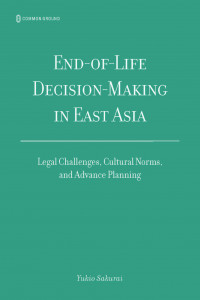End-of-Life Decision-Making in East Asia: Legal Challenges, Cultural Norms, and Advance Planning

November 12, 2025 - 8:00AM CST USA
How do cultural traditions, legal frameworks, and evolving policies shape end-of-life decision-making in East Asia? End-Of-Life Decision Making: Legal challenges, Cultural Norms and Advance Planning examines the complex interplay between family dependence, individual autonomy, and legal regulations in Japan, South Korea, Taiwan, and Singapore.
As medical advancements prolong life, the question of who should make end-of-life decisions—and how—becomes more pressing. This study explores the challenges of implementing advance directives (AD) and advance care planning (ACP), highlighting the tensions between personal choice and family expectations. Through a comparative analysis of legal cases, policy developments, and cultural factors, the book reveals the diverse approaches taken across East Asia. Developed through an extensive scholarly network, this work benefits from contributions by experts not only from East Asia but also from Australia, Italy, and Scotland. Their insights help refine the analysis, offering a broader perspective on the ethical and legal challenges of end-of-life care.
With its focus on harmonizing familial involvement with legal safeguards, this book provides essential insights for policymakers, healthcare professionals, and scholars of medical law and bioethics. It also serves as a valuable resource for anyone concerned with their own or their loved ones’ rights in end-of-life care. An essential read for understanding the future of end-of-life care in East Asia, this book challenges conventional assumptions and advocates for a more balanced and culturally sensitive approach to advance decision-making.
Read for free as a part of Common Ground Research Network's Open Access Program!